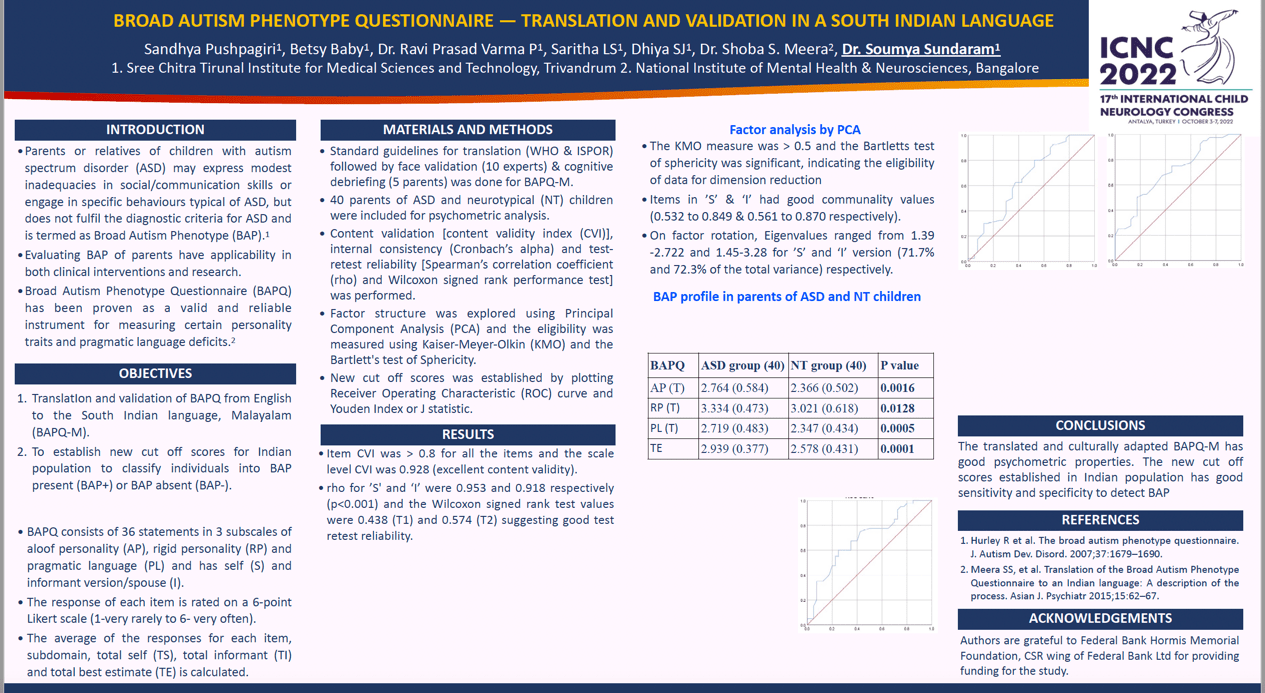Broad Autism Phenotype Questionnaire— Translation and Validation in a South Indian language followed by pilot study
Soumya Sundaram, P Sandhya , Betsy Baby , Raviprasad Varma, Shobha Meera
Objective Broad Autism Phenotype (BAP) describes individuals having minor traits of autism spectrum disorder (ASD) in the personality and pragmatic language domains.The objective of this study was to translate and validate BAP questionnaire (BAPQ) in the South Indian language, Malayalam.
Methodology BAPQ is a 36-item scale comprising 12 items each in three subdomains —aloof personality (AP), rigid personality (RP) and pragmatic language (PL). Translation into Malayalam (BAPQ-M) and validation of the translated version (content validity and test-retest reliability) followed by pilot study on 20 parents each of ASD children (ASD group) and neurotypical children (NT group) was done.
Results The content validity index of BAPQ-M was 0.9 (relevant). The intraclass correlation coefficient for test-retest reliability was 0.978 [ 95% CI 0.92-0.99; p <0.001] indicating high reliability. Demography, type of family, education level and socio-economic status were comparable between the two groups. The mean values of the three subscales and total (self, informant and total) scores were significantly higher in the ASD group. In Cohen’s d estimation, large effect size (>0.8) was observed in the total PL [2.719 ±0.483 vs 2.347±0.434, p value <0.001; Cohen’s d 0.81] and total best estimate (TBE) scores [2.939 ±0.377 vs 2.578 ±0.431; p value <0.001; Cohen’s d 0.892]. BAP was more frequent in the parents of ASD group as compared to NT group using TBE cutoff (3.15) [12/40 vs 4/36; p=0.0482].
Conclusion BAPQ-M has good validity index and reliability and can be used to detect BAP traits in relatives of ASD children.
Keywords: Broad autism phenotype; BAPQ; Malalayalam; translation; pilot study
Soumya Sundaram
Sree Chira Tirunal Insitute for Medical Sciences and Technology
India
P Sandhya
Sree Chitra Tirunal Institute For Medical Sciences And Technology
India
Betsy Baby
Sree Chitra Tirunal Institute For Medical Sciences And Technology
India
Raviprasad Varma
Sree Chitra Tirunal Institute For Medical Sciences And Technology
India
Shobha Meera
National Institute of Mental Health and Neurosciences (NIMHANS)
Objective Broad Autism Phenotype (BAP) describes individuals having minor traits of autism spectrum disorder (ASD) in the personality and pragmatic language domains.The objective of this study was to translate and validate BAP questionnaire (BAPQ) in the South Indian language, Malayalam.
Methodology BAPQ is a 36-item scale comprising 12 items each in three subdomains —aloof personality (AP), rigid personality (RP) and pragmatic language (PL). Translation into Malayalam (BAPQ-M) and validation of the translated version (content validity and test-retest reliability) followed by pilot study on 20 parents each of ASD children (ASD group) and neurotypical children (NT group) was done.
Results The content validity index of BAPQ-M was 0.9 (relevant). The intraclass correlation coefficient for test-retest reliability was 0.978 [ 95% CI 0.92-0.99; p <0.001] indicating high reliability. Demography, type of family, education level and socio-economic status were comparable between the two groups. The mean values of the three subscales and total (self, informant and total) scores were significantly higher in the ASD group. In Cohen’s d estimation, large effect size (>0.8) was observed in the total PL [2.719 ±0.483 vs 2.347±0.434, p value <0.001; Cohen’s d 0.81] and total best estimate (TBE) scores [2.939 ±0.377 vs 2.578 ±0.431; p value <0.001; Cohen’s d 0.892]. BAP was more frequent in the parents of ASD group as compared to NT group using TBE cutoff (3.15) [12/40 vs 4/36; p=0.0482].
Conclusion BAPQ-M has good validity index and reliability and can be used to detect BAP traits in relatives of ASD children.
Keywords: Broad autism phenotype; BAPQ; Malalayalam; translation; pilot study
Soumya Sundaram
Sree Chira Tirunal Insitute for Medical Sciences and Technology
India
P Sandhya
Sree Chitra Tirunal Institute For Medical Sciences And Technology
India
Betsy Baby
Sree Chitra Tirunal Institute For Medical Sciences And Technology
India
Raviprasad Varma
Sree Chitra Tirunal Institute For Medical Sciences And Technology
India
Shobha Meera
National Institute of Mental Health and Neurosciences (NIMHANS)

Soumya Sundaram
Sree Chira Tirunal Insitute for Medical Sciences and Technology India
Sree Chira Tirunal Insitute for Medical Sciences and Technology India